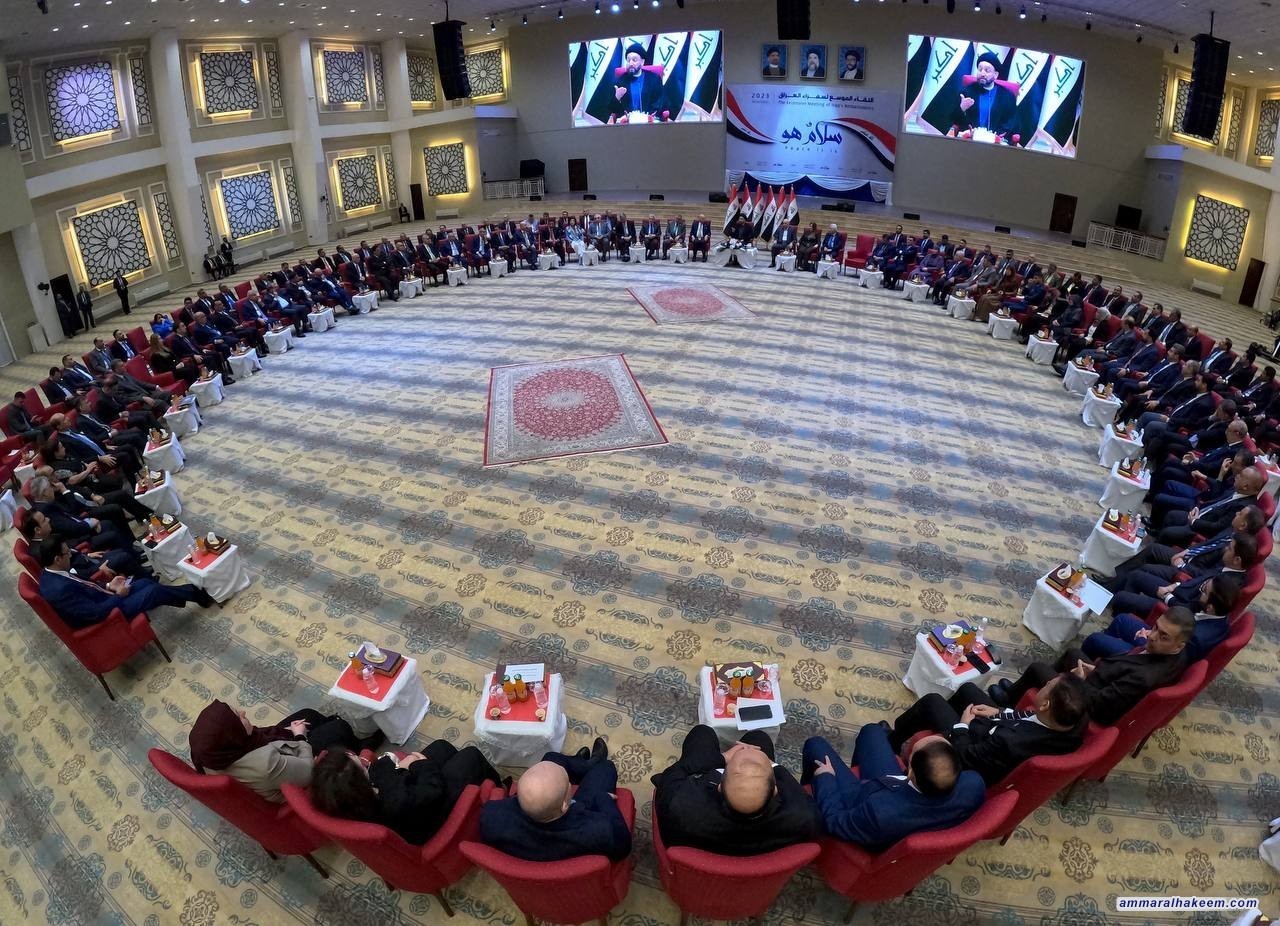While meeting with Iraqi ambassadors, Sayyid Al-Hakeem: The World lives in a moral crisis and double standard
Sayyid Al-Hakeem, Head of The National State Powers’ Alliance, emphasized that the world is facing a moral crisis, where more than two million and three hundred thousand individuals are trapped without access to essential necessities such as water, food, medicine, electricity, or fuel. These individuals are also enduring brutal and horrifying attacks. His Eminence pointed out that the world’s silence is attributed to the inconsistency in applying standards when dealing with freedom of expression, human rights, and the rights of people to express themselves.
During His Eminence’s interaction with the participating Iraqi ambassadors at the Seventh Conference of Iraqi Ambassadors, held on November 5, 2023, and attended by the Deputy Prime Minister and Minister of Foreign Affairs, Dr. Fuad Hussein, and the ministry's senior staff, Sayyid Al-Hakeem explained that the crisis in Gaza cannot be solely attributed to events after October 7; instead, it is the outcome of a challenging seven-decade period for the Palestinians. H.E. also commended the launch of the Seventh Conference of Iraqi Ambassadors, underscoring its significance in facilitating communication, consultations, and reviewing positions, particularly in light of the unique circumstances in the region and certain areas in Iraq and their repercussions.
H.E. praised Iraq's previous stance in supporting the Palestinian cause, highlighting the commitment at various levels, including references, government, diplomatic, popular, and media. H.E. emphasized that the authority to decide on peace and war resides with the Iraqi parliament, as enshrined in the constitution and upheld by the legislative body. H.E. called for a reevaluation of priorities, particularly in light of changes in Africa, and the need to engage more with the continent. Iraq's diplomatic representation in Africa requires a rethinking of priorities. H.E. also emphasized that the current challenge is primarily economic and environmental, given that Iraq has moved beyond security and politics. H.E. noted that political stability fosters security, social stability, and promising economic opportunities. Additionally, H.E. reiterated the description of the State Administration Coalition as a governing coalition that transcends sectarian and ethnic divides.
H.E. stressed the importance of promoting Iraq's achievements, dispelling negative perceptions, and projecting positive images. Embassies play a crucial role as they represent Iraq globally and are the primary sources that shape international perceptions of the country. The current diplomatic priorities include:
Addressing deeply ingrained negative perceptions of Iraq in the minds of regional and global nations and promoting a positive image of Iraq.
Giving precedence to Iraq's economic interests in diplomatic endeavors and pushing for economic partnerships that benefit Iraq. Encouraging international companies to establish offices in Iraq rather than relying solely on regional offices.
Adhering to diplomatic principles and grounding diplomatic dealings in Iraq's unified national identity, in contrast to previous approaches.
Showcasing Iraq as a tourist destination, highlighting its wealth of natural, historical, and religious attractions catering to diverse global preferences.
Leveraging soft diplomacy, focusing on decision-makers in countries where Iraq is represented, and providing support for influential figures. Popular diplomacy should also be employed, engaging with countries' social and community networks, with actions aligned with national interests.
Emphasizing competency standards in the selection of Iraq's representatives in international organizations and the new diplomatic corps. Promoting intergenerational cooperation and capitalizing on Iraq's diplomatic expertise. Identifying the strengths of countries where diplomats serve and aiming to replicate their success stories for the benefit of Iraq.
Advocating for influence on decision-making centers in countries based on well-thought-out strategies tailored to each political system and its decision-making institutions. Ambassadors should act as facilitators in solving issues rather than complicating them through engagement on multiple fronts. Prioritizing the Iraqi diaspora and harnessing their competencies for the nation's advancement, while differentiating between the representation of societal components and political and sectarian considerations.
H.E. emphasized the need to elevate the status of embassies as they serve as the face of Iraq abroad and are the primary points where external perceptions of Iraq are formed. H.E. reaffirmed Iraq's balanced approach and the importance of preserving this equilibrium, emphasizing that Iraq exists for its people and acts in their interests. He encouraged seizing the current opportunity to renew the diplomatic corps while maintaining componential balance and distinguishing between representing societal components and adhering to political and sectarian fairness.


/9/3/photo_2025-12-10_09-25-13.jpg)
/9/2/photo_2025-12-10_09-17-58.jpg)
/9/1/photo_2025-12-10_09-11-13.jpg)
/8/3/photo_2025-12-09_10-42-49.jpg)
/8/2/photo_2025-12-09_10-37-31.jpg)
/8/1/photo_2025-12-09_09-54-18.jpg)
/7/1/photo_2025-12-08_09-38-41.jpg)
/5/1/photo_2025-12-07_09-25-35.jpg)
/3/2/photo_2025-12-04_11-05-55.jpg)
/3/1/photo_2025-12-03_11-49-28.jpg)